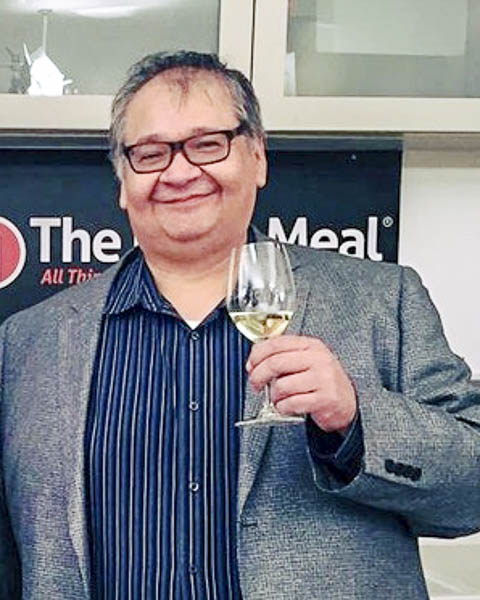What does it take to get American cheese into a European cheese shop? And will anybody buy it? Raymond Hook, a New York City-based specialty-food broker, is getting close to some answers. Working with partners, Hook is attempting to build a global audience for cheeses from Oregon’s Rogue Creamery (like Rogue Smokey Blue, above), Virginia’s Meadow Creek Dairy and Georgia’s Sweet Grass Dairy, among others. The export learning curve has left a few bruises, but Hook is an optimist. Today: London. Tomorrow: the world.
How helpful is the Federal government?
I have to say, this is a struggle. Each creamery needs an export ID number, and the government only issues them every three months. If you miss by a day, it’s six months until you can get it. And there is no punch list: you need to do this and then that. We’ve had to figure it out on our own. The government says they’re in business to help you, but they spend time on people who want to export containers, not somebody trying to ship a pallet.
You have to get health certificates from each dairy: $82 each. And from one of our five dairies we needed two health certificates, for raw-milk and pasteurized-milk cheese. So that’s just shy of $500 before air freight, import duties and transportation from Heathrow.
Our first shipment wasn’t allowed into England. They destroyed the cheese because the paperwork wasn’t correct. We had the health certificates, but we didn’t know that raw-milk cheese needs a different certificate. These are painful mistakes.
I would have thought the U.S. government was on our team, but after our first shipment, we got a pop inspection from the FDA. They came to my office to inspect my paperwork and were in and out in 30 minutes. They charged me $450 for my share of the expenses of flying the inspector here from California, plus car rentals, hotels, everything. The inspector was looking for the letter from each supplier saying they can trace the cheese back to the milk source. I could have just e-mailed those to her. I was so shocked when I got that bill.
Where in Europe are you selling cheese and why are those the target markets?
We are selling currently in England, Scotland and Wales. The Fine Cheese Company in Bath is one of my partners. They believe in the quality of American cheese, and they have a lot of wholesale accounts in the U.K. We have sold cheese to Selfridges, to Harrods, to Whole Foods. The Fine Cheese Company also has shops in Bath and in the Belgravia section of London.
Going global: Raymond Hook
We have some interest in France, which is kind of shocking, and also Germany. We had strong interest from Finland but there’s a 230 percent import tariff. Tariffs are what’s going to drive where we can ship.
It’s a pricey endeavor, but our goal is global. We’re talking to people in Singapore and Dubai. It’s all about logistics and seeing what the end cost is.
So, in U.S. dollars, what are London shoppers paying for these cheeses?
Humboldt Fog is about $29 a pound. Meadow Creek Grayson would be about $35 a pound. Rogue Creamery Smokey Blue, about $36 a pound. The top end is Rogue River Blue at about $50 a pound.
And what’s selling?
Based on the orders we’ve received, the best-selling cheeses are Pleasant Ridge Reserve, Sweet Grass Green Hill and Humboldt Fog. So far, washed-rind cheeses don’t seem to be very popular. I think they like the uniqueness of Humboldt Fog. Smokey Blue is a great cheese and also a bit unique.
The domestic sales manager for The Fine Cheese Co. says that the image of American cheese is burger cheese. He hears that over and over. The notion that America makes great cheeses is suspect. We’re going to have to put a lot of cheese in a lot of mouths to overcome that perception. But we’ve picked the cream of the crop. Pleasant Ridge Reserve is spectacular cheese; any knowledgeable person would say it’s one of the best in the world.
Fast-forward 10 years.
We make world-class cheese in America and there is a market for it, as there is for every great artisan product. It will just take time and energy and a lot of people leaning into it. I’m waiting for that moment, like when California wines were judged greater than French wines.
Hong Kong is very trade friendly, and once you get into Hong Kong you can sell into China. Look at the wine market. The Chinese are mass consumers of Burgundy. They’re embracing the Western ideal of luxury, although it kills me to call cheese a luxury food.
This project is a passion for me. If I was doing is to get rich quick, boy, am I in the wrong business.
New! Cheese Classes at CIA Copia
Four Napa Valley wines, four artisan cheeses. Learn how to create the kind of wine-and-cheese marriages that make sparks fly. In this guided one-hour tasting, I’ll share strategies for creating satisfying matches so you can confidently repeat the pleasure at home. Participants receive a same-day discount on signed copies of Cheese & Wine.
Friday, September 15, 2017
Friday, October 6, 2017
Friday, October 20, 2017



